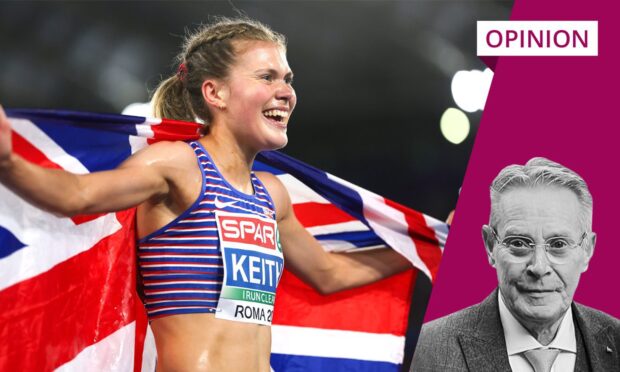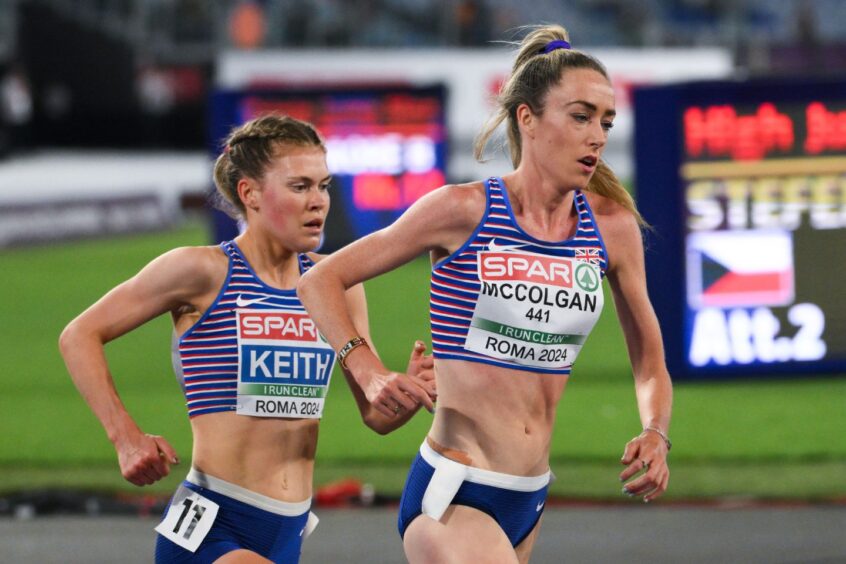Have you heard how the A9 now stretches from the Highlands to the Paris Olympics?
And the A96, for that matter.
As an issue, I mean.
Quite a distance record, worthy of a medal but for the fact that the Olympic finale came too soon.
In the case of the A96, rest assured it’s nothing to do with Aberdeen City Council.
And its penchant for inflicting bizarre road schemes on the public using regulations no one has ever heard of.
More specifically, the roads issue has surfaced amid contrasts between family support for athletes and miserly public funding.
Highland runner Megan Keith’s quest for Olympic glory left her facing an obstacle which threatened to sidetrack her success.
She already had enough to worry about preparing for Paris, but Megan was also weighed down by fears that her only suitable training facility in the Highlands – Queens Park, Inverness – could be shut.
Due to the track deteriorating and possibly failing to meet quality standards.
I never knew until now that a running track needed a certain level of shock absorbency to enable talented athletes to perform.
A springy base layer, I suppose; no wonder joggers’ joints take a pounding on hard pavements.
So as Megan headed off to Paris for the 10,000 metres on Friday night she must have been wondering if she’d have a home track to come back to.
In the days before she competed in Paris, her coach highlighted Megan’s bleak alternative training options if the track wasn’t fixed.
She would have no choice but to travel all the way to Perth via the A9 or along the A96 to Aberdeen to train at the nearest alternative tracks which met the standard.
And we know what a long-distance travel nightmare that would be.
Such a farcical and arduous consequence of funding shortfalls might be seen as a complete humiliation and national embarrassment.
Council cuts in the Highlands and Aberdeen risk future Olympic heroes
Megan’s bravery shone through despite falling behind in the race, but she’s an inspirational figure after making it to the Olympics.
Luckily, sports bodies in the Highlands appear to be doing something to try to save the track.
Meanwhile, Aberdeen has been facing “catastrophic” council cuts which could close pools and sports halls.
What would John Swinney think about it all after he poured praise on Scots athletes in Paris?
And threats of traversing the A9/A96 cast a shadow on Megan’s long road to Paris.
The roads saga resurfacing again like a running sore – as an exhausting complication in a Paris Olympian’s life – was the last thing Swinney wanted to see.
Especially as the SNP’s shocking arrogance and complacency had delayed vital safety upgrades on the roads for years.
They live with the consequences after being dumped at the ballot box.
Their direction of travel over the roads fiasco is one of the reasons the governing party was seen to disconnect with public opinion.
Domestic issues really mattered to ordinary people, but tone-deaf ministers pursuing grandiose ideological projects didn’t.
For many long-suffering travellers, this athletic slant on the A9/A96 offers a timely reminder as a painful SNP party conference looms at the end of the month.
A kind of Olympics for the SNP, which also faces a long road ahead to rebuild credibility, but a lot further than 10,000 metres.
Only one thing flowed faster than medals in Paris: tears of emotion.
Floods of them as families who sacrificed everything hugged their offspring after they crossed the winning line.
They moved me to tears, too.
All the hours of ferrying them around for training at ungodly times of day paid off for many parents and grannies.
I remember freezing my socks off at a football festival with my grandson, 8, in Turriff.
It was so cold I tried hugging a metal fence pole to stay warm.
I stopped because I didn’t think removing a frost-bitten man from a fence was a sensible use of public money.
These loving families triumph above all sorts of obstacles – and incompetence through public servants closing facilities.
The glamour and glitter of the Paris Olympics has been packed away for another four years, but issues about public funding for sport remain as the daily training grind for athletes marches on.
I watched two charming young British chaps on television talking modestly about their successes in the Olympic gymnastics events.
But emotions started to bubble over as the conversation turned to how their respective grannies became their rocks during training.
They ferried the lads selflessly here and there so they could prepare properly for the Olympics.
“I think the world of my nan,” one reflected with a lump in his throat and a medal in his hand.
And so say all of us.
But how many could cope with 200-mile round trips from Inverness along the dreaded A9/A96 on bleak wintry days?
David Knight is the long-serving former deputy editor of The Press and Journal


Conversation